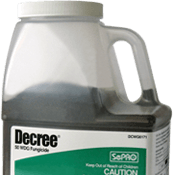Decree®
The Industry Standard for Botrytis Control.


With excellent crop safety and no residue concerns, Decree Fungicide is an exceptional tool throughout the season. Decree's 12-hour REI allows for Botrytis control in propagation and at retail, while its residual control gives growers the best value per application.
Decree has been determined to be a Reduced Risk Fungicide by the EPA indicating its minimal impact to humans and the environment. Decree can be applied to flowers in bloom and poinsettias in full color with little detectable residue and no phytotoxicity. In a FRAC group all on its own, Decree an excellent fungicide rotational partner.
At very low concentrations, Decree inhibits hyphal growth and germ tube elongation of Botrytis cinerea. The germ tube growth stage is considered to be the most sensitive stage in the life cycle of Botrytis cinerea (happening outside the plant tissue, on the plant surface, before penetration of the leaf cuticle).
Botrytis prefers humid, cool environments, close crop spacing and overhead irrigation. Botrytis commonly affects geraniums, poinsettias, African violets, petunias, roses, hydrangeas, vincas, kalanchoes, and lisianthus.
SePRO provides high-quality solutions for insect and disease control, as well as plant growth regulation to help you bring healthy, sellable plants and produce to your customers. See how we can help.